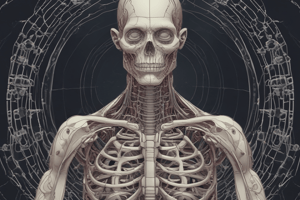Podcast
Questions and Answers
What is the primary function of the skeletal and muscular system?
What is the primary function of the skeletal and muscular system?
Which hormone produced by the kidneys is responsible for regulating blood pressure?
Which hormone produced by the kidneys is responsible for regulating blood pressure?
How does the cardiovascular system support homeostasis?
How does the cardiovascular system support homeostasis?
What role does estrogen play in the body?
What role does estrogen play in the body?
Signup and view all the answers
Which system is primarily responsible for maintaining the acid-base balance in the body?
Which system is primarily responsible for maintaining the acid-base balance in the body?
Signup and view all the answers
Study Notes
Skeletal and Muscular System
- The skeletal and muscular systems work together to move the body.
- Bones provide the structure for muscles to attach to.
- Muscles generate the force for movement, enabling limb movement and locomotion.
- Locomotion is crucial for accessing food, providing essential nutrients and maintaining homeostasis.
Kidney
- The kidney is vital for maintaining overall body homeostasis.
- It regulates extracellular fluid volume and electrolyte concentrations.
- It balances the body's acid-base levels.
- It filters waste products from the blood.
- It produces hormones: erythropoietin (stimulates red blood cell production), renin (regulates blood pressure), and calcitriol (promotes phosphate reabsorption and calcium absorption).
Cardiovascular System
- The heart circulates blood, maintaining systemic circulation.
- This system delivers oxygen and nutrients to body tissues and organs.
Respiratory System
- Lungs facilitate oxygen delivery to tissues and carbon dioxide removal from the body.
Endocrine System
- The endocrine system regulates metabolism, growth, development, sleep, mood, sexual function, reproduction, stress response, and various other bodily functions, utilizing feedback mechanisms.
- Most endocrine mechanisms operate using negative feedback loops.
Reproductive System
- The reproductive system plays a role in creating offspring.
- Sex hormones influence bodily functions, such as muscle growth (testosterone) and bone growth (estrogen).
- Estrogen deficiency can impair bone development.
Studying That Suits You
Use AI to generate personalized quizzes and flashcards to suit your learning preferences.
Description
This quiz covers key aspects of the human skeletal, muscular, kidney, cardiovascular, and respiratory systems. Understand how these systems work together to maintain homeostasis and support bodily functions. Test your knowledge on their structure and roles in overall health.



